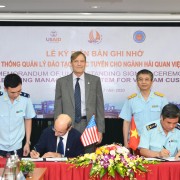Speeches Shim
Assistive devices are extremely beneficial in supporting persons with disabilities’ independence in daily activities. To increase the capacity of health staff who prescribe these devices, on July 24-26, USAID’s Moving Without Limits activity conducted its first training for service providers in Tam Ky city, in collaboration with the Hue Medical and Pharmacy University and Rehabilitation Center and Bach Mai Hospital. This training provided participants with basic skills to assess patients' daily-living activities and prescribe adaptive tools that support them at home or at work. This will enhance the trainees’ assessments and identification of suitable intervention approaches, which can involve a combination of strategies, including assistive devices. The training also encouraged service providers to assess physical home environments while designing accessibility solutions. Two additional courses will be conducted in August 2020 for service providers in Thua Thien Hue and Binh Dinh.

On July 21, the USAID Trade Facilitation Program and VCS signed an MOU to establish an e-Learning Management System (eLMS) aimed at building the long-term capacity of Vietnam Customs. Once established, VCS will be able to develop and offer e-learning courses to Vietnam Customs officials and private sector businesses such as brokers and freight forwarders on key customs topics such as risk management, rules of origin, integrity, among others. The MOU will enable VCS to simultaneously host more than 1,000 e-learning trainees. Further specialization and professional development of Vietnam Customs will support Customs efforts to facilitate trade and prevent issues such as illegal transshipment and origin fraud.
Vietnam is now globally-recognized for its impressive response to the COVID-19 pandemic, with fewer than 400 confirmed cases in six months (only 106 of which were transmitted in Vietnam) and zero deaths since the first case arrived from China on January 23. Key elements included strong and consistent national leadership; strict border controls; aggressive case-finding and isolation; determined contact-tracing and quarantine even to three degrees of separation; availability and scale-up of quality laboratory testing; and transparent and frequent public communication. Such strong rapid response was possible only because the country systems and public health and clinical workers were well-prepared.
Ho Chi Minh City is home to about 30 percent of all patients on HIV treatment in Vietnam. As international donor funding for HIV treatment will mostly end this year, in order to maintain treatment for these individuals, the city must quickly pivot funding to domestic sources. To help address this situation, the USAID Sustainable HIV and Tuberculosis Response from Technical Assistance project worked with site staff and provincial officials to quantify and procure drugs, develop health information systems, and educate clinicians and patients about social health insurance and HIV. As of June 29, all ten sites supported by USAID in Ho Chi Minh City have been providing social health insurance-covered HIV treatment to patients with valid social health insurance cards.
The ‘A Rieu chili’ is a tiny, spicy, aromatic, and high-value pepper indigenous to the mountainous region of Dong Giang district in Quang Nam province. While cultivation of this chili pepper can provide a reliable livelihood for Co Tu ethnic minority communities in Dong Giang, until recently, they lacked the technical knowledge and necessary capital to do so. In 2018, the USAID Green Annamites project collaborated with the Ma Cooih Agriculture and Forestry Cooperative (Ma Cooih Coop) to help Co Tu ethnic minority communities living in seven villages in Dong Giang district to grow this valuable pepper.

Comment
Make a general inquiry or suggest an improvement.